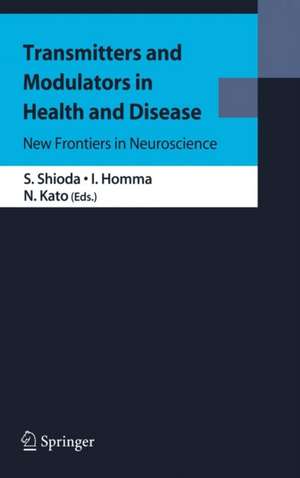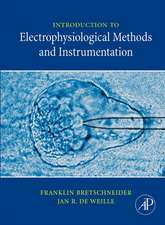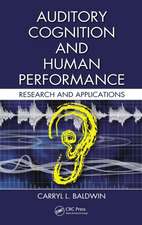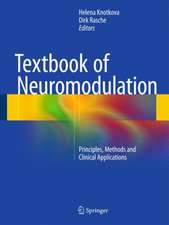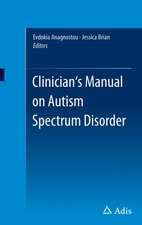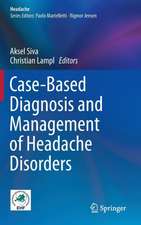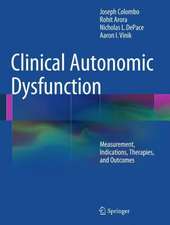Transmitters and Modulators in Health and Disease: New Frontiers in Neuroscience
Editat de Seiji Shioda, Ikuo Homma, Nobumasa Katoen Limba Engleză Hardback – 29 apr 2009
| Toate formatele și edițiile | Preț | Express |
|---|---|---|
| Paperback (1) | 712.60 lei 6-8 săpt. | |
| Springer – 20 oct 2010 | 712.60 lei 6-8 săpt. | |
| Hardback (1) | 719.95 lei 6-8 săpt. | |
| Springer – 29 apr 2009 | 719.95 lei 6-8 săpt. |
Preț: 719.95 lei
Preț vechi: 757.85 lei
-5% Nou
Puncte Express: 1080
Preț estimativ în valută:
137.76€ • 144.20$ • 114.66£
137.76€ • 144.20$ • 114.66£
Carte tipărită la comandă
Livrare economică 31 martie-14 aprilie
Preluare comenzi: 021 569.72.76
Specificații
ISBN-13: 9784431990383
ISBN-10: 4431990380
Pagini: 240
Ilustrații: XXIII, 212 p.
Dimensiuni: 155 x 235 x 15 mm
Greutate: 0.52 kg
Ediția:2009
Editura: Springer
Colecția Springer
Locul publicării:Tokyo, Japan
ISBN-10: 4431990380
Pagini: 240
Ilustrații: XXIII, 212 p.
Dimensiuni: 155 x 235 x 15 mm
Greutate: 0.52 kg
Ediția:2009
Editura: Springer
Colecția Springer
Locul publicării:Tokyo, Japan
Public țintă
ResearchDescriere
Prominent international researchers contributed to this volume of reports advancing the study of brain function and morphology. Comprising investigations in several areas of neuroscience, the book includes research in neurodegenerative diseases and in neuroregeneration in adults. Described here are the effects of neuropeptides and biogenic amines on feeding, respiration, and other autonomic functions as well as on behavior. One chapter focuses on regulation of the blood brain barrier function by various neuropeptides, proteins, receptors, and transporters. Another is concerned with the modulation of higher brain functions by neuropeptides and biogenic monoamines. Yet another chapter presents research on ischemic neuronal damage and hippocampal neurogenesis in the adult mouse. Morphological or physiological techniques to study neuropeptides and neuromodulators influencing higher-order or brain-stem functions are given particular attention. The use of bio-imaging tools such as brain navigation systems and fMRIs with patients in a clinical setting creates new possibilities for investigation of human brain function and specialization of treatment.
Cuprins
Neuropeptides and BehaviorEvolution of Neuropeptide Concepts Illustrated by MIF-1 and MSHIncreased Leptin Supply to Hypothalamus by Gene Therapy Confers Life-long Benefits on Energy Homeostasis, Disease Cluster of Metabolic Syndrome- Diabetes Type 1 and 2, Dyslipidemia and Cardiovascular Ailments- and Bone RemodelingFeeding Regulation in the Brain: Involvement of Neuropeptide WFeeding Regulation in the Brain: Role of Galanin-Like Peptide (GALP) Neuropeptides, Bioamines, and Clinical ImplicationsNeuropeptide Y and Its Role in Anxiety-Related DisordersThe Search for a Fetal Origin for Autism: Evidence of Aberrant Brain Development in a Rat Model of Autism Produced by Prenatal Exposure to ValproateSexually Dimorphism and Social Brain Circuit: Its Implication to Autism Functional Mapping of Sensory and Motor Brain ActivityStimulating Music: Combining Melodic Intonation Therapy with Transcranial DC Stimulation to Facilitate Speech Recovery after StrokeSerotonin Release Acts on 5-HT2 Receptors in the Dorsomedial Medulla Oblongata to Elicit Airway Dilation in MiceBreathing Is to Live, to Smell and to FeelRole of the Medial Frontal Wall for Readiness of Motor Execution Poster PresentationsRyanodine Receptor Type 1 / Calcium Release Channel in the Endoplasmic Reticulum as the Target of Nitric Oxide to Cause the Intracellular Calcium SignalingDecreased Sensitivity to Negative Facial Emotions and Limbic Lesions in Patients with Myotonic Dystrophy Type 1Generation of Rac1 Conditional Mutant Mice by Cre/loxP SystemOrexin Modulates Neuronal Activities of Mesencephalic Trigeminal Sensory Neurons in RatsInvestigation of the Anxiolytic Effects of Kampo Formulation, Kamishoyosan, Used for Treating Menopausal Psychotic Syndromes in WomenActivation of Microglia Induced Learning and Memory DeficitsIncreased Behavioral Activity with Regular Circadian Rhythm in PACAP Specific Receptor (PAC1) Transgenic MiceExpression and Localization of Pituitary Adenylate Cyclase-Activating Polypeptide (PACAP) Specific Receptor (PAC1R) after Traumatic Brain Injury in Mice
Caracteristici
Describing the effects of neuropeptides and biogenic amines on feeding, respiration, and other autonomic functions as well as on behavior.
